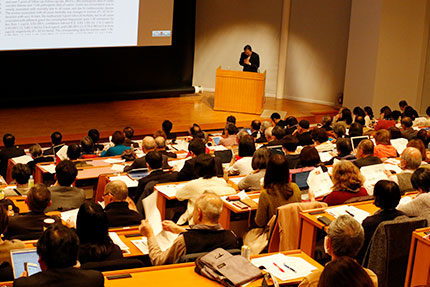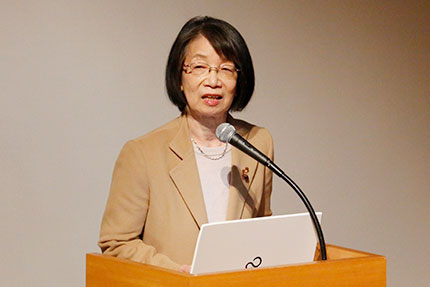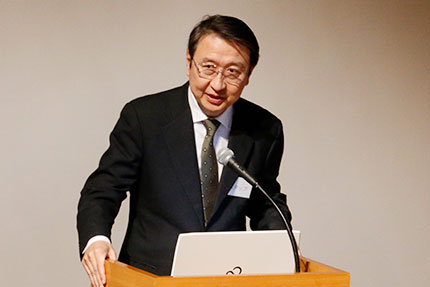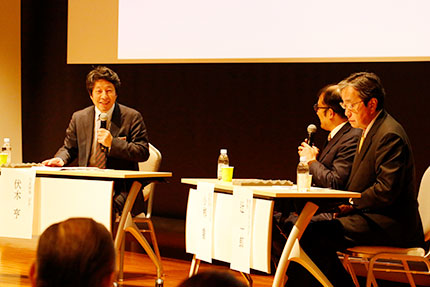HOME > Holding report of recent event > Canon Foundation hosts a symposium on the theme of "Japanese food and the long life it leads to"
Canon Foundation hosts a symposium on the theme of "Japanese food and the long life it leads to"

On February 4, a joint symposium by the Canon Foundation and Washoku Japan (the General Incorporated Association of Japanese Food Culture) entitled "Washoku and Health Spring 2020: A Scientific Rediscovery of Japanese Food and the Long Life It Leads To" was held in the Akiba Hall at Fujisoft Akiba Plaza in Chiyoda City, Tokyo.
This symposium, the fourth in the Washoku and Health series, was held with the support of the Ministry of Agriculture, Forestry and Fisheries, Tohoku University and Ishikawa Prefectural University. Applications for the symposium greatly exceeded capacity instantly after they started being accepted, resulting in a massive turnout on the day of the event.
The symposium commenced with a message from Yoko Ōkubo, Chairman of the Investigation and Research Subcommittee under Washoku Japan. This was followed by a summary description of the Canon Foundation and an introduction of its initiatives geared towards the research of "food" by Canon Foundation Secretary General Tetsuro Hoshino.
Afterwards, two Canon Foundation-funded researchers presented their respective research results and most recent findings on the themes of Japanese food and health from a scientific angle.
Speaking on the theme of "Japanese food culture nurtured by traditional fermented foods and the healthy future that they bring us," Associate Professor Takashi Koyanagi of Ishikawa Prefectural University introduced real-life examples of those foods, saying "Kaburazushi and narezushi (forms of fermented sushi), both of which are traditional fermented foods from Ishikawa Prefecture, are healthy foods on the same level as yogurt, in which the rich content of lactobacillus conditions the intestinal environment." He also spoke on the importance of revisiting the value of traditional fermented foods, which are being increasingly less consumed as more and more new and different foods are introduced, as we move forward, noting "Was it traditional fermented foods rich in lactobacillus that nurtured the stomachs of Japanese people over time?"
In his discussion of the theme of "the impact that Japanese food has on physical and mental health," Professor Ichiro Tsuji of Tohoku University spoke of how the results of his cohort study to research the association that nutrition intake and dietary habits have with health, disease and disability, a study he administered to 52,000 individuals in Ōsaki City, Miyagi, indicated that Japanese food leads to the suppression of the likes of circulatory system disease and dementia. Additionally, he also introduced the fascinating results of Canon Foundation-funded research by Tohoku University Associate Professor Tsuyoshi Tsuzuki that illustrated how Japanese food in 1975, a year in which a particularly diverse array of ingredients was ingested relative to the history of Japanese food, prevents the likes of obesity and diabetes and otherwise demonstrates advanced health utility while also lengthening health expectancy.
Taking the stage in the panel discussion that capped the symposium were Washoku Japan Representative Director Tōru Fushiki as the discussion's moderator and coordinator and the two research presenters as panelists. The three of them went back and forth over familiar topics such as the ideal salt content of soup stock and fermented foods for making rice taster to eat. The resulting discussion was both lively and easy to understand.
Going forward, the Canon Foundation will continue to regularly hold symposiums by its funded researchers for outside participants.














